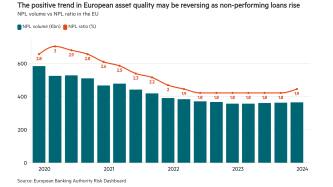The European Central Bank (ECB) says it is continuing to decarbonise its corporate bond holdings in line with net-zero ambitions. However, a report published by Greenpeace and three UK universities claim that the ECB’s decarbonisation strategy is “rapidly losing steam” with the central bank failing to “clean its portfolio of dirty bonds” from energy giants like ENI, TotalEnergies, Shell and BP.
The report, published at the end of July by SOAS University of London, the University of Greenwich, the University of the West of England and Greenpeace, says the ECB is “passively unwinding its corporate bond holdings” and allowing them to mature without being replaced.
Climate considerations
The ECB disputes any accusation that it is moving away from a Paris-aligned trajectory. “Despite the run-off of the Asset Purchase Programme reinvestments since July, we foresee that our corporate bond holdings will keep decarbonising on a path consistent with the Paris Agreement throughout 2023,” an ECB spokesperson told The Banker. “We remain committed, within our mandate, to continue integrating climate considerations into our monetary policy and supporting the objectives of the Paris Agreement in 2024 and beyond.”
The ECB has consistently made it clear that its primary objective is price stability, and that any climate-related measures it takes will be in line with this objective.
the ECB has failed to actively divest from climate-wrecking bonds
However, Greenpeace disagrees with that statement.
“While the ECB acknowledges that climate action falls within its mandate, the bank has failed to actively divest from climate-wrecking bonds by fossil fuel developers,” said Kuba Gogolewski, a finance campaigner with Greenpeace, in a press statement.
Carbon exposure
The report estimates that around 23% of the outstanding amount of green bonds, or 10 bonds in total, bought by the ECB as part of its reinvestments from the beginning of October 2022 to the end of June 2023, were issued by fossil fuel companies, while 10 additional bonds, or 30%, of the outstanding amount of green bonds were bought from other carbon-intensive companies.
The non-governmental organisation (NGO) is calling on the ECB to immediately divest from bonds of companies investing in fossil fuels and to ban the possibility of buying new bonds issued by such firms, even when they claim to be green bonds.
In March 2023, the ECB published its first climate-related financial disclosures, showing that its corporate bonds were “on a decarbonisation path”, with the weighted average carbon intensity of corporate bond purchase flows decreasing by more than 65% in the fourth quarter of 2022 compared with the first three quarters of the year. One of the reasons for this reduction was the ECB’s decision to tilt its holdings towards issuers with a better climate performance, highlighted the bank at the time.
It is the abandonment of this “stronger tilting approach” about which the report is so concerned. It suggests the central bank can begin to right its apparent wrongs by starting to sell the bonds of weak climate performers and to buy the bonds of strong climate performers. Such steps “would provide strong climate signals to the financial markets about the need for bond issuers to get serious about the climate crisis”, says the report.
Difficult position
Sima Kammourieh, international sustainable finance lead at think tank E3G, says the report shows that banking objectives need to become “synonymous with climate safety”. She agrees that the ECB is in a “difficult” position given the current economic context of high inflation, but underlines that climate change and the need to decarbonise are “not going away”. Ways need to be found to better manage short-term risks like inflation with other risks like climate change, says Ms Kammourieh.
Despite the critical nature of the report, Yannis Dafermos, senior lecturer in economics at SOAS and one of the report’s authors, welcomes the fact the ECB took into account downstream Scope 3 emissions in its climate action plan. But he calls for the central bank to be more transparent about the weighting given to these emissions when making decisions about companies.
Read more on divestment
“In our view, there is room to be stricter,” Mr Dafermos says. He points to the announcement by the Bank of France in March 2023 that it would exclude companies developing oil and gas extraction projects by the end of 2024.
Reclaim Finance, a French NGO, has called for the ECB to follow the French central bank’s lead, and for the Bank of France’s policies to become “the locomotive of the Eurosystem on the greening of monetary policy”.












